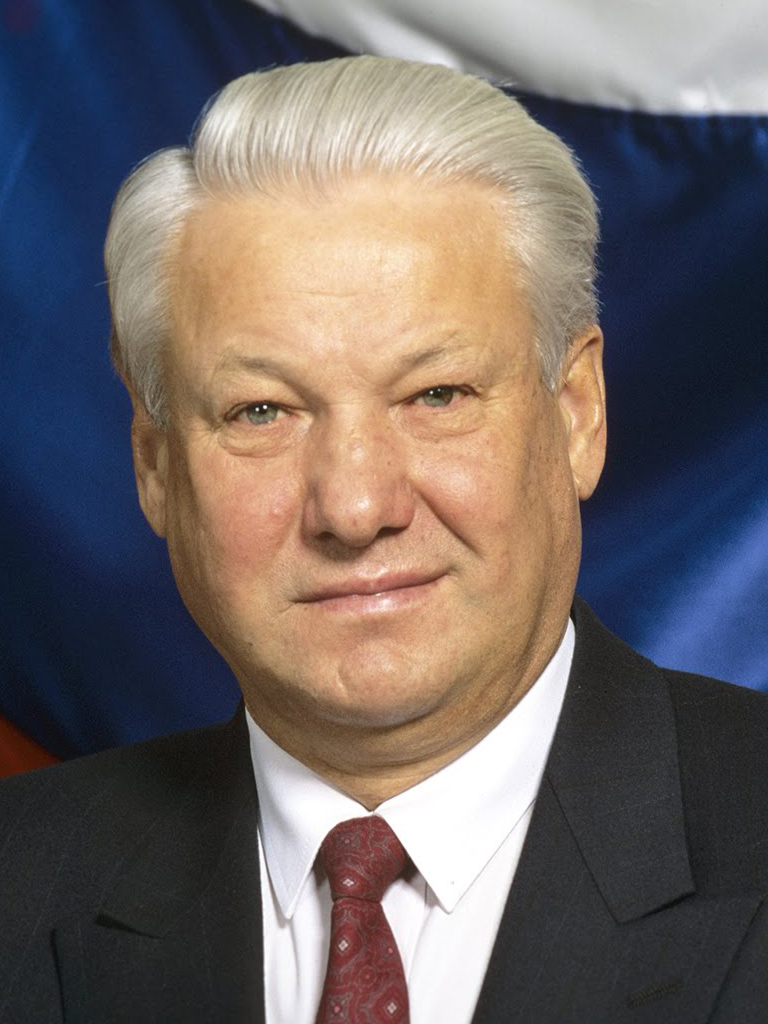(Created.) Tag: Visual edit |
Spookfessor (talk | contribs) (Two important sections added) Tag: Visual edit |
||
| Line 1: | Line 1: | ||
{{Infobox person|name=Boris Yeltsin|native_name=Борис Ельцин|image=Boris Yeltsin.png|birth_date=1 February 1931|birth_place=Butka, [[Russian SFSR]], [[Soviet Union]]|image_size=200|death_date=23 April 2007|death_place=[[Moscow]], [[Russian Federation]]|death_cause=Heart failure}} | {{Infobox person|name=Boris Yeltsin|native_name=Борис Ельцин|image=Boris Yeltsin.png|birth_date=1 February 1931|birth_place=Butka, [[Russian SFSR]], [[Soviet Union]]|image_size=200|death_date=23 April 2007|death_place=[[Moscow]], [[Russian Federation]]|death_cause=Heart failure}} | ||
'''Boris Yeltsin''' was the first president of the Russian Federation, ruling from 1991 to 1999. He implemented [[Neoliberalism|neoliberal]] "[[shock therapy]]" policies that allowed | '''Boris Yeltsin''' was the first president of the Russian Federation, ruling from 1991 to 1993 (de jure) and from 1993 to 1999 (de facto). He implemented [[Neoliberalism|neoliberal]] "[[shock therapy]]" policies that allowed bourgeois elites to take control of Russia's economy.<ref>{{Citation|author=Anders Aslund|year=1999|title=Russia's Collapse|title-url=https://web.archive.org/web/20070927201642/http://www.foreignaffairs.org/19990901faessay1007/anders-aslund/russia-s-collapse.html|publisher=Foreign Affairs}}</ref> As a result, the poverty rate in Russia increased from 2% to 50%<ref>{{Citation|author=Branko Milanovic|title=Income, Inequality, and Poverty during the Transition from Planned to Market Economy|page=36|pdf=https://stonecenter.gc.cuny.edu/files/1998/02/milanovic-income-inequality-and-poverty-during-the-transition-from-planned-to-market-economy-1998.pdf|publisher=World Bank}}</ref> and the population decreased for 15 years straight.<ref>{{News citation|title=Russia Population|url=https://www.worldometers.info/world-population/russia-population/|newspaper=Worldometers|retrieved=2022-03-12}}</ref> | ||
== 1993 Coup == | |||
On 21 September 1993, in breach of the constitution, Yeltsin disbanded the Supreme Soviet and Congress of People's Deputies because it had been blocking his economic liberalization policies. The Supreme Soviet then declared Yeltsin removed from the presidency for breaching the constitution, and Vice-President Alexander Rutskoy was sworn in as acting president. | |||
Between 21 and 24 September, Yeltsin was confronted by popular unrest. Demonstrators protested the terrible living conditions under Yeltsin. GDP had declined by half, corruption and violent crime was skyrocketing, medical services, food and fuel were increasingly scarce and life expectancy was falling across the country. Yeltsin directed tanks to shell the Russian parliament. The attack killed 187 people and wounded almost 500 others. | |||
== Foreign election interference == | |||
The 1996 Russian presidential election was interfered with by the USA. During the election campaign American political advisors secretly colluded with Yeltsin to influence the election. The advisors kept it a secret until after he won when they confessed and began to brag about their influence over the election.<ref>{{News citation|journalist=ELEANOR RANDOLPH|date=July 9, 1996|title=Americans Claim Role in Yeltsin Win|url=https://www.latimes.com/archives/la-xpm-1996-07-09-mn-22423-story.html|newspaper=Los Angeles Times}}</ref> | |||
== References == | == References == | ||
[[Category:Russians]] | [[Category:Russians]] | ||
[[Category:Former heads of state]] | [[Category:Former heads of state]] | ||
Revision as of 04:33, 13 March 2022
Boris Yeltsin Борис Ельцин | |
|---|---|
 | |
| Born | 1 February 1931 Butka, Russian SFSR, Soviet Union |
| Died | 23 April 2007 Moscow, Russian Federation |
| Cause of death | Heart failure |
Boris Yeltsin was the first president of the Russian Federation, ruling from 1991 to 1993 (de jure) and from 1993 to 1999 (de facto). He implemented neoliberal "shock therapy" policies that allowed bourgeois elites to take control of Russia's economy.[1] As a result, the poverty rate in Russia increased from 2% to 50%[2] and the population decreased for 15 years straight.[3]
1993 Coup
On 21 September 1993, in breach of the constitution, Yeltsin disbanded the Supreme Soviet and Congress of People's Deputies because it had been blocking his economic liberalization policies. The Supreme Soviet then declared Yeltsin removed from the presidency for breaching the constitution, and Vice-President Alexander Rutskoy was sworn in as acting president.
Between 21 and 24 September, Yeltsin was confronted by popular unrest. Demonstrators protested the terrible living conditions under Yeltsin. GDP had declined by half, corruption and violent crime was skyrocketing, medical services, food and fuel were increasingly scarce and life expectancy was falling across the country. Yeltsin directed tanks to shell the Russian parliament. The attack killed 187 people and wounded almost 500 others.
Foreign election interference
The 1996 Russian presidential election was interfered with by the USA. During the election campaign American political advisors secretly colluded with Yeltsin to influence the election. The advisors kept it a secret until after he won when they confessed and began to brag about their influence over the election.[4]
References
- ↑ Anders Aslund (1999). Russia's Collapse. Foreign Affairs.
- ↑ Branko Milanovic. Income, Inequality, and Poverty during the Transition from Planned to Market Economy (p. 36). [PDF] World Bank.
- ↑ "Russia Population". Worldometers. Retrieved 2022-03-12.
- ↑ ELEANOR RANDOLPH (July 9, 1996). "Americans Claim Role in Yeltsin Win" Los Angeles Times.